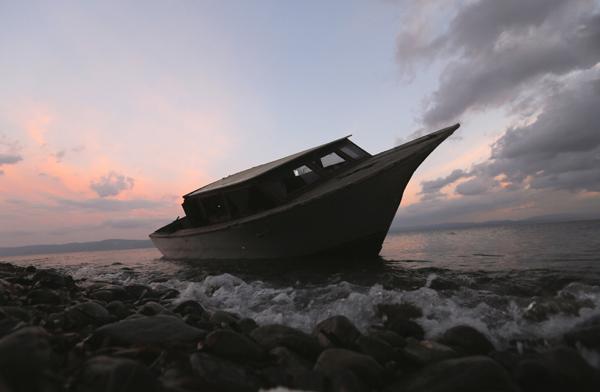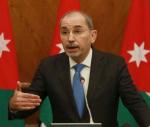You are here
Wary EU leaders meet on Turkey migration deal
By Reuters - Mar 17,2016 - Last updated at Mar 17,2016

Refugee children walk along railway tracks at a makeshift migrant camp in the northern Greek border post of Idomeni, on Thursday (AP photo)
BRUSSELS — European Union leaders met on Thursday seeking agreement with Turkey to stop migrants reaching Greece and voiced a mix of hope for a fix to the crisis and caution that a deal could fall through or prove unworkable.
European Council President Donald Tusk said he was "more cautious than optimistic" before chairing evening summit talks where the 28 EU national leaders aim to forge a common position before meeting Turkish Prime Minister Ahmet Davutoglu on Friday.
German Chancellor Angela Merkel, who first devised the plan with Davutoglu and sprang it on surprised peers at a special summit 10 days ago, said she thought it possible to overcome fellow leaders' lingering concerns over the legality and practicalities of deporting all new migrants back to Turkey in return for political and financial concessions to Ankara.
"These will be complicated negotiations but the basic direction is clear," she told reporters, adding that she shared Tusk's "cautious optimism, with the emphasis on cautious".
A key problem is Turkey's four-decade dispute with EU member Cyprus, whose President Nicos Anastasiades insisted there could be no agreement to speed up Turkey's EU membership talks until Ankara stops barring Cyprus from its sea and airports — itself a result of a broader refusal to recognise the Cypriot state.
"Cyprus is not the obstacle," Anastasiades said.
There is anger in Nicosia at Merkel for appearing to make Davutoglu an offer without consulting Cyprus — especially at a time when talks on reuniting with the Turkish-backed north of the island are at a delicately hopeful stage. And Tusk, a former Polish premier, made clear Cypriot interests must be respected.
"The agreement must be acceptable to all 28 member states, no matter big or small," he told a news conference.
‘Edge of the law’
Nonetheless, after a year in which more than a million people have arrived in Europe fleeing war and poverty in the Middle East and beyond, EU countries are looking desperately to Turkey to seal its coastline and stem the flow.
But Tusk forecast difficult talks, saying any agreement must fully comply with European and international law; UN agencies and rights groups have been sceptical it will do that, and some EU leaders arriving at the summit shared that disquiet.
Lithuanian President Dalia Grybauskaite said the package was "very much on the edge of international law" and, even if agreed, appeared over-complicated and hard to implement.
Prime Minister Alexis Tsipras, facing a build-up of tens of thousands of refugees stranded in Greece by border closures in the Balkans, said his economically struggling country needed more help to care for migrants.
EU officials said Greece also needed time to set up legal and administrative structures to carry out the deportations.
In Ankara, a senior official said countries like Cyprus should not be allowed to block progress. Turkey does not intend to make new demands or proposals, the official added, seeming to rule out any goodwill gesture to break the stand-off with Cyprus.
EU officials expected Davutoglu and Tusk to meet late on Thursday to prepare for Friday's breakfast with EU leaders.
A draft agreement circulated by Tusk and debated by EU ambassadors on Wednesday evening watered down two important inducements to Turkey and included new safeguards intended to overcome legal objections to sending back migrants.
Ankara's central objective — visa-free travel for Turks to Europe by June — will depend on Turkey meeting a raft of long-standing EU criteria. That need to meet all 72 conditions was stressed by French President Francois Hollande, whose voters are alarmed by the idea of 75 million Muslim Turks free to travel.
Under the plan, Turkey would take back all those, including Syrian refugees, who cross to Greek islands. The EU would also double an agreed 3 billion euro fund to help refugees in Turkey.
The draft, seen by Reuters, says the aim is "to break the business model of the [people] smugglers" and to offer migrants an alternative to putting their lives at risk. It stresses the return is "a temporary and extraordinary measure which is necessary to end the human suffering and restore public order".
Related Articles
BRUSSELS — The European Union warned on Wednesday that a deal with Turkey to curb mass migration to Europe hinges on Ankara acting to suppor
NICOSIA — Tiny Cyprus on Tuesday threatened to derail a proposed EU deal with Turkey to end Europe's migration crisis, warning it would not
BRUSSELS — At least 25 people including children drowned trying to cross the Aegean Sea on Sunday, a day before a summit at which European l

















